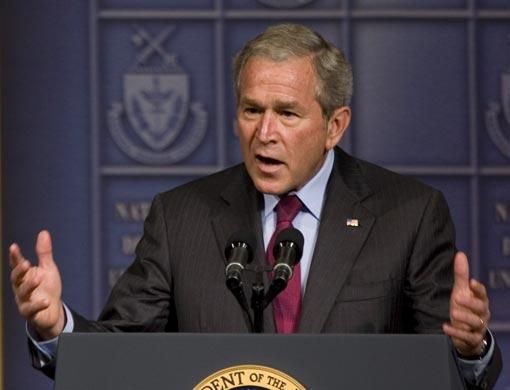Washington: President Bush announced on Tuesday that he will keep the US force strength in Iraq largely intact until the next president takes over, drawing rebukes from Democrats who want the war ended and a bigger boost of troops in troubled Afghanistan.
The president said he will pull home about 8,000 combat and support troops by February - a drawdown not as strong or swift as long anticipated. No more Army combat brigades will withdraw in 2008, the final year of a Bush presidency that has come to be dominated by the war.
Bush's announcement, in a speech at the National Defense University, is perhaps his last major move on troop strategy in Iraq. He said more US forces could be withdrawn in the first half of 2009 if conditions improve in Iraq.
Wartime decisions
But he leaves office in January, so his successor will be making the wartime decisions.
There are about 146,000 US troops in Iraq.
"Here is the bottom line: While the enemy in Iraq is still dangerous, we have seized the offensive, Iraqi forces are becoming increasingly capable of leading and winning the fight," Bush said.
Still, most of the US forces are staying. Bush chose to emphasise that he was moving forward with "additional force reductions."
Criticism from Democrats
But Democrats quickly shot back that Bush isn't doing enough to get troops out of Iraq, and into Afghanistan, where violence is rising.
"The President's plan to reduce force levels in Iraq may seem to signal movement in the right direction, but it really defers troop reductions until the next administration," said the chairman of the House Armed Services Committee, Rep. Ike Skelton, D-Mo. "More significant troop reductions in Iraq are needed so that we can start to rebuild US military readiness and provide the additional forces needed to finish the fight in Afghanistan."
Said Senate Majority Leader Harry Reid: "I am stunned that President Bush has decided to bring so few troops home from Iraq and send so few resources to Afghanistan."
In all, about 8,000 US forces will be coming back, the president said.
One Marine battalion, numbering about 1,000 troops, will go home on schedule in November and not be replaced. An Army brigade of between 3,500 and 4,000 troops will leave in February. Accompanying that combat drawdown will be the withdrawal of about 3,400 support forces over next several months.
Bush's strategy appears to leave the political calculus of the presidential race unchanged.
Democratic presidential nominee Barack Obama has advocated pulling all US combat forces out of Iraq within 16 months of taking office. GOP nominee John McCain has said he would rely on the advice of US military commanders to determine the timing and pace of troop reductions.
Both candidates have said more troops are needed in Afghanistan, where there has been a resurgence of the Taliban and a growth in violence.
The president offered a portrait of an Iraq on the rise by almost any measure: declining violence, improving governance, returning normalcy of life.
His military commanders say the security improvements in the country are becoming more durable, yet still fragile. That helps explain the cautious approach of keeping most US forces on site, without resuming the monthly withdrawal of Army combat brigades of earlier this year.
In his upbeat account of the war, the president shared credit all around. "The progress in Iraq is a credit to the valor of American troops and civilians, the valor of Iraqi forces and the valor of our coalition partners," he said.













